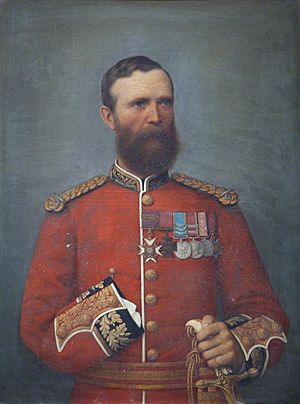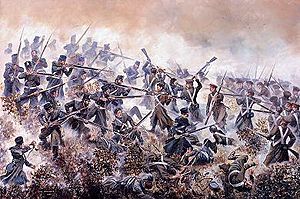Mark Walker (British Army officer) facts for kids
Quick facts for kids
Sir Mark Walker
|
|
|---|---|

Walker in around 1891, by an unknown artist
|
|
| Born | 27 November 1827 Finea, County Westmeath, Ireland |
| Died | 18 July 1902 (aged 74) Arlington Rectory, Devon, England |
| Buried |
Cheriton Road Cemetery, Folkestone
|
| Allegiance | United Kingdom |
| Service/ |
British Army |
| Years of service | 1846–1893 |
| Rank | General |
| Unit | 30th Regiment of Foot 3rd Regiment of Foot |
| Battles/wars | Crimean War Second Opium War |
| Awards | Victoria Cross Knight Commander of the Order of the Bath Order of the Medjidie, 5th Class (Ottoman Empire) |
| Relations | Sir Samuel Walker, 1st Baronet |
| Other work | Honorary Colonel of the Sherwood Foresters |
General Sir Mark Walker was a brave officer in the British Army. He was born in Ireland in 1827. He is famous for receiving the Victoria Cross. This is the highest award for bravery given to soldiers in the British and Commonwealth forces. He showed incredible courage when facing the enemy.
Early Life and Family
Mark Walker was born in a place called Gore Port, in Finea, County Westmeath, Ireland. His parents were Captain Alexander Walker and Elizabeth Elliott. Mark had a younger brother named Sir Samuel Walker, 1st Baronet. Samuel became a very important lawyer and politician in Ireland.
Bravery and the Victoria Cross

Sir Mark Walker earned his Victoria Cross during the Crimean War. He was a 26-year-old lieutenant at the time. A lieutenant is a junior officer in the army. He was serving with the 30th Regiment of Foot. This regiment later became known as the East Lancashire Regiment.
The Victoria Cross is given for "most conspicuous bravery, or some daring or pre-eminent act of valour or self-sacrifice, or extreme devotion to duty in the presence of the enemy." Sir Mark Walker's actions during the war were truly heroic.
His Victoria Cross medal was once shown at a museum in Canterbury, England. Now, it is part of the collection at the National Army Museum.
Life After the War
During his service in the Crimea, Sir Mark was badly wounded. A large shell hit him, and he lost his right arm. Even with this injury, he continued to serve his country.
He fought in the Second Anglo-Chinese War in 1860. After that, he received many promotions. He became a lieutenant-colonel in 1861. Later, he became a colonel in 1869.
From 1875 to 1879, he commanded a group of soldiers in Madras, India. During this time, he was promoted to major-general. He also commanded troops in places like Aldershot and Gibraltar. In 1888, he became a lieutenant-general.
Sir Mark Walker retired from the army in 1893 with the high rank of general. He was also given a special honor called Knight Commander of the Order of the Bath. This is a very important award for service to the country.
From 1900 until he passed away, he was an honorary colonel for the Sherwood Foresters regiment. This means he was a special leader for them.
Sir Mark Walker died in England on July 18, 1902. There is a special plaque honoring him at Canterbury Cathedral.
Personal Life
In 1881, Sir Mark Walker married Catherine Chichester.
 | Bessie Coleman |
 | Spann Watson |
 | Jill E. Brown |
 | Sherman W. White |

